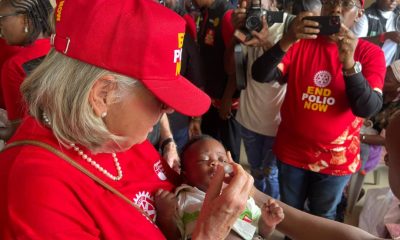General News
Building Social Blocks of Peace As Stop-Gaps For Domestic Terrorism

By Benneth Joshua Kingsley
There are two types of terrorism – International and Domestic terrorism. The American Federal Bureau of Investigation (FBI) sees International Terrorism as violent, criminal acts committed by individuals and/or groups who are inspired by, or associated with designated foreign terrorist organizations or nations (State-sponsored).
It also sees Domestic Terrorism as violent, criminal acts committed by individuals and/or groups to further ideological goals stemming from domestic influences, such as those of a political, religious, social, racial, or environmental nature.
Whilst both definitions have similarities, e.g as violent, criminal acts committed by individuals and/or groups, their points of divergence lies where international terrorism is State sponsored or associated with foreign terrorist organizations, as against domestic terrorism which is home bred.
This literature shall build its intervention on the definitions advanced by the FBI, and shall focus on the causative agents of domestic terrorism – home bred violent, criminal acts committed by individuals and/or groups to further ideological goals stemming from domestic influences, such as those of a political, religious, social, racial, or environmental nature.
It is hoped that this intervention would further the conversation on closing the gaps leading to domestic terrorism. It is necessary to point out that at the root of domestic terrorism are social factors that speak directly to individual members of the society. In order words, terrorism in both embryonic and active phases are conceptualized and carried out with the individual as the Critical Execution Vehicle (CEV).
There are risk factors which point to the potential for radicalization of individuals, thereby opening the window of opportunity for extremist personality/ies to impart on them. While some of these risk factors are static, meaning that they cannot change over time (e.g., having a criminal history), others can change and, thus, suggest possible avenues for prevention and intervention efforts.
The United States Department of Justice through a 2018 Journal published by its National Institute of Justice identified some relative risk factors as relevant in individuals’ particular cases. According to the US DOJ, efforts that focus on addressing terrorist beliefs, treating mental health issues, improving individuals’ employment or educational prospects, and/or helping them to develop and sustain positive relationships with non-extremist and non-delinquent peers may contribute to preventing or intervening in cases of domestic terrorism.
Whilst it is true that social realities in OECD countries differ in many ways than many obtainables in third world countries, especially in Nigeria, the journal’s intervention which pointed out factors such having a criminal history, having mental health issues (or having received a diagnosis of schizophrenia or delusional disorder), being unemployed, being single, being a loner (or socially isolated), and having military experience (in peculiar situations like those suffered by some Nigerian ex-service men, being unjustly discharged military or paramilitary services, or being owed their entitlements for long period of time) as possible triggers to individual’s joining terrorist adventures or acting as ‘Lone Sharks’, cannot be wished away.
Personal and political grievances, having an enabler who assists in planning an attack or provides the inspiration for it, having at least a bachelor’s degree, living alone, and being male were also identified as potential risk factors among self actors. These, like police brutality said to have triggered Boko Haram in the Northeast of Nigeria, the EndSars protest and its subsequent reported massacre in Lagos, and the Unknown Gunmen debacle, are social lacuna that results in grievances leading to domestic terrorism.
Unemployment also crystallizes in Lone Shark domestic terrorism, especially among youths with tertiary education training. It explains the spike in crime rate – kidnapping, armed robbery, ritual killings for fetish money making practices, increasing incidence of rape, political violence, among others, as witnessed in Nigeria.
What this means is that any productive intervention aimed at reconstructing terrorism narrative in Nigeria, and perhaps in Sub Saharan African countries has to look in the direction of focusing energy on treating mental health issues, improving individuals’ employment prospects, and/or helping them to develop and sustain positive relationships. Adesoji Adelaja and Justin George in their contribution to the discussion on domestic terrorism titled: “Perspectives on Terrorism” Volume 14, Issue 5, pointed out the dire youth unemployment situation in less-developed countries, noting that it has a correlation to insurgency.
They said that the dire youth unemployment situation in less-developed countries (LDCs) is particularly troubling; especially in Sub-Saharan Africa (SSA), where the continent faces the highest level (70 per cent) of youth working poverty rate globally. On average, of the 10 to 12 million youth entering the workforce, only 3.1 million jobs are created annually, leaving the vast majority unemployed; for example, in Nigeria and Ghana, respectively 43 and 48 per cent of youth aged 15–24 are unemployed or underemployed.
Both scholars acknowledged that youth unemployment may also fuel youth out-migration from Africa, dependencies and stresses on adults, unrealized growth opportunities, youth restiveness and greater potential for radicalization and conflict.
Flowing from this, many of the countries which are prone to political violence, especially terrorism, feature higher employment rates among the youth population than their adult population; for example, the Middle East and North Africa (MENA) region, which hosted around 40 per cent of the total incidence of terrorist attacks in the 2011–2015 period, experienced a youth unemployment rate of 30 per cent in 2019, double the global average.
Beehner (2007) contends that youth unemployment creates a large pool of disaffected youth who are more susceptible to recruitment into rebel or terrorist groups, as found in Northeast Nigeria. Stober (2015) submitted that the high rate of unemployment in Nigeria has created an army for the deadly Boko Haram, kidnapping, political thuggery and ethnic conflicts in the nation. Idrees, Shabbir, Roman, & Atif, (2015) in their contribution to the subject matter noted that unemployed youths due to their frustration and socio-economic difficulties and afflictions provide fertile ground for their recruitment into terrorism and others, especially Boko Haram in Nigeria.
The implication of this statement is that unemployment, with its nature, afflicts its victims psychologically to the extent that they are weighed down by pressures due to lack of necessities of life as their situation does not promote or provide welfare in any way. This therefore makes it easy for the unemployed youths to be radicalized. Adelaja, Labo, & Penar (2018) underscored that radicalization appeals to these unemployed youths who may consider such as the best option to their distress and frustrated situation.
Scholars like Suleiman and his associate identified armed robbery, political thuggery, kidnapping, Boko Haram, and other criminal acts among youths as the result of youth unemployment. Some of the youths who are unemployed due to frustration have turned themselves to suicide bombers, vandals, bandits, terrorists, kidnappers, militants, armed robbers, and lots more.
Besides unemployment, other social factors which open the window to terrorism include bad governance, lack of quality education or training, lack or inadequate basic infrastructures, corruption and corrupt practices of government officials, perceived victimization, ethnic superiority, religious superiority, domination and exploitation, materialism and the display of it with impunity, etc.
Taking the items one after another, bad governance doesn’t just undermine development; it also drives violence. In Nigeria, for example, experts say that the government helped to create terrorism through its lack of an inclusive growth strategy.
In essence, ineffective public institutions undermine the provision of public services such as health care, education and law enforcement. When public officials do not act as bureaucrats delivering services as they are expected to do, people look for alternative ways to obtain these services. And this increases disenchantment in the system.
Accordingly, Nigeria like many Sub-Saharan African countries is an epicenter of disenchantment caused by poor governance, with the state unable to spread the provision of public services to citizens. In most urban areas in the country, and in every rural area, citizens provide public utilities like water, electricity, security and others for themselves.
This in juxtaposition with glaring economic inequalities, oppression from the state and the privileged few, and gross abuse of human rights, coupled with the marginalization of minority populations provide the trigger for some to join violent or terrorist groups.
So, poor or bad governance tends to frustrate the institutionalization of both peace and security on the one hand, and on the other, creates a stunted, rentier, disarticulated, and grossly underdeveloped society where modern day terrorism thrives.
Considering that the use of military power has not been able to quell terrorism, some experts believe that education in cohort with other social factors is another major weapon that can be used in reducing to the barest minimum, the incidence where people are attracted to radicalization or terrorism.
A 2017 intervention by UNESCO reveals that educational strategies to support prevention efforts varies a great deal according to context – e.g. conflict situation, demographics, citizenship model, private/public education, with the common denominator of prevention efforts being to address the drivers of violent extremism and build learners’ resilience to hateful narratives and propaganda that legitimize the use of violence.
The fifth review of the United Nations Global Counter-Terrorism Strategy 1 (30 June – 1 July 2016) provided the reemphasized, among other objectives, the importance of prevention efforts and welcomed the UN Secretary-General’s Plan of Action to Prevent Violent Extremism (released in December 2015).
On this occasion the UN General Assembly recommended that countries consider the implementation of its relevant recommendations, as applicable to national contexts, with the support of the United Nations. In the Plan, the UN Secretary-General calls for a comprehensive approach to address the underlying conditions that drive individuals to join violent extremist groups.
Among its action priorities is the necessity to support “Education, skills development and employment facilitation” as a means to foster respect for human diversity and prepare young people to enter the workplace. The recommendation also addresses the need to invest in programmes that promote global citizenship and provide comprehensive primary through tertiary education, including technical and vocational education.
This underlines the importance which the global community at the UN level attaches to education as a social stop-gap to radicalization and terrorism.
Without a doubt, domestic terrorism is linked to any or all of the stated social factors. And it is the belief of this work that the phenomenon is intricately connected with the balance or imbalance of social structures.
This work also agrees with other scholars that to reduce the tendencies of the target population (the youths) from being attracted to it, the inequality gap in societies must be closed through proactive and strategic public-oriented policies that provide for the citizenry.
Therefore, the point being made here is that efforts at mitigating the emergence of the social factors that provokes violent extremism, and vanguards, are social blocks of peace which creates stop-gaps for domestic terrorism.
General News
US Property Scandal: Timi Frank Urges Tinubu To Suspend, Probe Wike Now

US Property Scandal: Timi Frank Urges Tinubu To Suspend, Probe Wike Now
Former Deputy National Publicity Secretary of the All Progressives Congress (APC), Comrade Timi Frank, on Thursday, called on President Bola Tinubu to urgently suspend Nyesom Wike as minister of FCT and cause investigation to be carried out
on his US property scandal.
Frank who made this assertion in a statement in Abuja, called on the President to break his silence on the scandal and demonstrate the same commitment to accountability like the way he acted swiftly and unequivocally in suspending former cabinet minister Betta Edu over corruption charges far less serious than those now confronting Minister Wike.
According to media reports, Wike allegedly acquired property in Florida, and to hide the assets, he allegedly registered them under his wife’s name, Justice Eberechi Wike, and children, Joaquin, Jazmyne, and Jordan.
According to the United Liberation Movement for West Papua (ULMWP) Ambassador to East Africa and the Middle, President Tinubu’s silence in the face of overwhelming evidence of the houses in public domain is troubling.
“With detailed reports from credible sources such as People’s Gazette and Sahara Reporters, and with glaring evidence ignored by anti-corruption agencies like EFCC and ICPC, it sends a dangerous message that some officials are untouchable,” he lamented.
He urged the President to be aware that impunity and arrogance of government officials like Wike weakens citizens trust in governance and contribute to revolts like the Nepal uprising.
He commended Omoyele Sowore of Sahara Reporters and the Publishers of People’s Gazette for their courage in exposing corruption in the country, irrespective of serving government officials involved.
He warned Tinubu not to make any official in his cabinet feel as if they are untouchable or they are God.
He stated that the Presidency represents the integrity of Nigeria and must uphold the principle that no one is above the law, regardless of political alliances.
Frank added: “The reasons behind this continued inaction in the case are of Wike appear tied to the political calculations surrounding the 2027 presidential elections.
“However, allowing political ambition to shield corruption will irreparably harm Nigeria’s reputation internationally.
“The world is watching, and this selective justice undermines investor confidence and portrays Nigeria as a nation unable or unwilling to fight corruption—even within its highest offices.
“Furthermore, even when crises erupted in Rivers State, President Tinubu suspended only Governor Siminalayi Fubara and the House of Assembly members while leaving the Minister of FCT, Wike, untouched.
“This inconsistency fuels suspicions of favoritism and political shielding. Nigerians and the international community deserve to know why the President appears reluctant to confront alleged corruption linked to a close political ally.
“Selective enforcement of the law erodes national pride and makes Nigeria a laughing stock among peer nations, many of whom prosecute corruption allegations without hesitation.
“We urge President Tinubu to immediately suspend and commission an independent investigation into Minister Wike, just as was done with Betta Edu.
“The President should protect the dignity of Nigeria and the trust of its citizens by rejecting selective justice and political expediency. The integrity of Nigeria’s governance and its image on the global stage depend on it.”
General News
Be selfless, Rotary Club President advises Interactors

From Adeko Ukpa, Abuja
The President of the Rotary Club of Abuja Maitama, Rtn. Rosemond Favour Uche has advised Interactors to be selfless.
She also asked the Interactors to put service to the society above any gain.
She implored them to work peace wherever they may be because development thrives in a violence-free environment.
Rosemond gave the charge at a quiz and debate competition between the Interact clubs of J.S.S Dutse Alhaji 1 and Parliament School, Apo in Abuja.
“You are the future of Rotary International, I want to advise you to be selfless in whatever you do.
“You should know that until everyone is accommodated that there can be a just society. We don’t need divisions along ethnic or religious lines”, she said.

PHOTO CAPTION: The President of the Rotary Club of Abuja Maitama, Rtn. Rosemond Favour Uche presenting a gift to Miss Civir-Ter Bemgba after a quiz competition organised for members of the Interact Clubs of J.S.S Dutse Alhaji 1 and Parliament School Apo on “Peace building and conflict prevention ” in Abuja while Rtn. Cynthia Igbokwe watches.
Rosemond pleaded with the young students to put service above any other pursuit.
She said: “You must put service above self. You should learn to serve the society to leave legacies instead of seeking personal gains.
“This is the main focus of Rotary International. We want a society where there will be a sense of belonging for all; we want a world where we will only serve and not expecting anything in return.”
The District Governor-elect, Dame Princess Joy Nky Okoro urged the Interactors to learn to be “good citizens. “
General News
Timi Frank welcomes Tinubu’s order releasing detained minors, urges FG to compensate victims

By Adeko Ukpa
African Telescope reports that a former Deputy National Publicity Secretary of the All Progressives Congress (APC), Comrade Timi Frank, on Tuesday, described President Tinubu’s directive on the release of minors arrested and detained during the #EndBadGovernance protests as a step in the right direction.
Frank who made this assertion in a statement in Abuja, however, urged the President to equally order the release of all detainees being held for exercising their constitutional right to protest against bad policies of government because the “President is known to have embarked and led series of protests during the pro-democracy struggle and in 2012 when the administration of President Goodluck Jonathan removed fuel subsidy.”
He urged the President to equally reverse some of his bad economic policies like the floating of the naira and outright removal of fuel subsidy which have brought untold hardship in the country and worsened the condition of living of majority of Nigerians.
He expressed commitment to commend the President when he takes a positive step in governance and criticize him when his action is against the wellbeing of the generality of Nigerians.
He called on the Federal Government to compensate the minors, after release, for violating their fundamental human rights and cruelty meted on them by the police who detained them for over three months under dehumanizing conditions without trial.
Frank said: “We warmly welcome President Bola Tinubu’s decision to order the immediate release of minors arrested during the #EndBadGovernance protests from detention.
“The President’s action acknowledges the concerns of Nigerians and the international community regarding the treatment of protesters, especially minors.
“However, we also call for accountability and reform within the intelligence community.
“The fact that minors were detained for over 90 days without prompt attention from the President’s office raises concerns about the effectiveness of our intelligence agencies.
“We urge the President to investigate this lapse and consider replacing intelligence chiefs who failed to bring this matter to his attention.”
He demanded that the probe ordered by the President should start from the Inspector General of Police, Kayode Egbetokun, the Commissioners of Police in-charge of Kano and Kaduna states who arrested the minors.
“This probe must not be swept under the rug, we shall monitor to ensure that the findings are made public and appropriate sanctions meted out to officers found to be complicit,” he said.
Besides, to ensure adequate justice for the victimised and oppressed minors, he urged the Federal Government to provide financial assistance to their families, offer the minors scholarships and enroll them in reputable boarding schools to help them overcome their traumatic experiences.
“The minors should also be availed the services of professional counsellors to address any emotional or psychological distress.
“By taking these steps, we can begin to heal the wounds of the past and build a more just and compassionate society for all Nigerians,” he said.
-
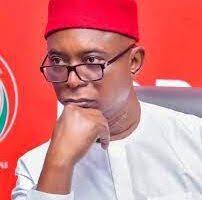
 Opinion9 months ago
Opinion9 months agoAnioma State: A Necessary Proposal Rooted in Strategic Advantage
-
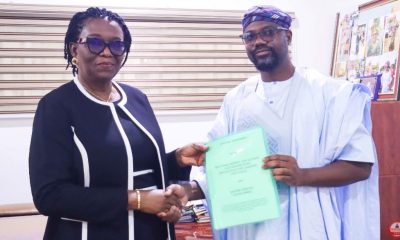
 Business & Economy1 year ago
Business & Economy1 year agoNASENI, Qietur partner to build 3000 Housing Units for Staff
-
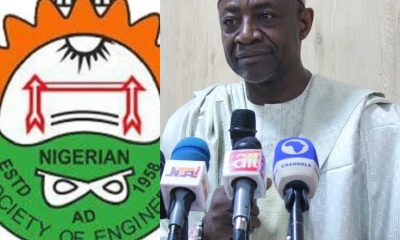
 Business2 months ago
Business2 months agoLithium boom has reshaped Nasarawa’s economy, says Prof Haruna
-
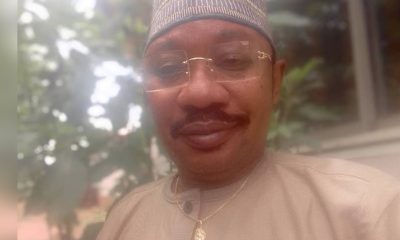
 Law1 year ago
Law1 year agoHuman Right and Law Enforcement in Nigeria: A Critical Analysis
-
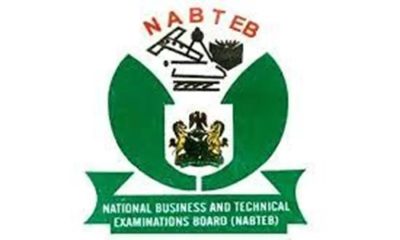
 Education3 months ago
Education3 months agoNABTEB Registrar advises automotive, locomotive Engineers to do more to diversify Nigerian economy
-

 Education6 months ago
Education6 months agoTVET will change Nigeria for good, says NABTEB Registrar
-
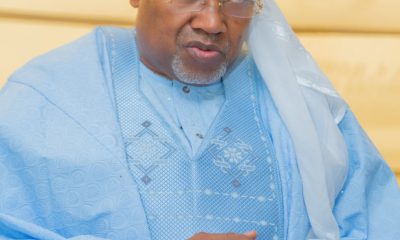
 Opinion3 months ago
Opinion3 months agoEngr. Kawu: A Heroic Homecoming for a Man of the People
-
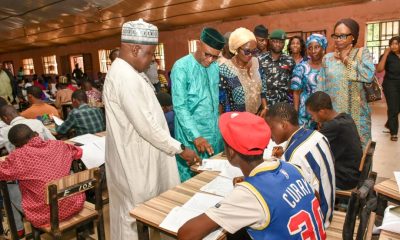
 Education6 months ago
Education6 months agoTVET: FG conducts entrance exam into FTCs for 30,000 students



